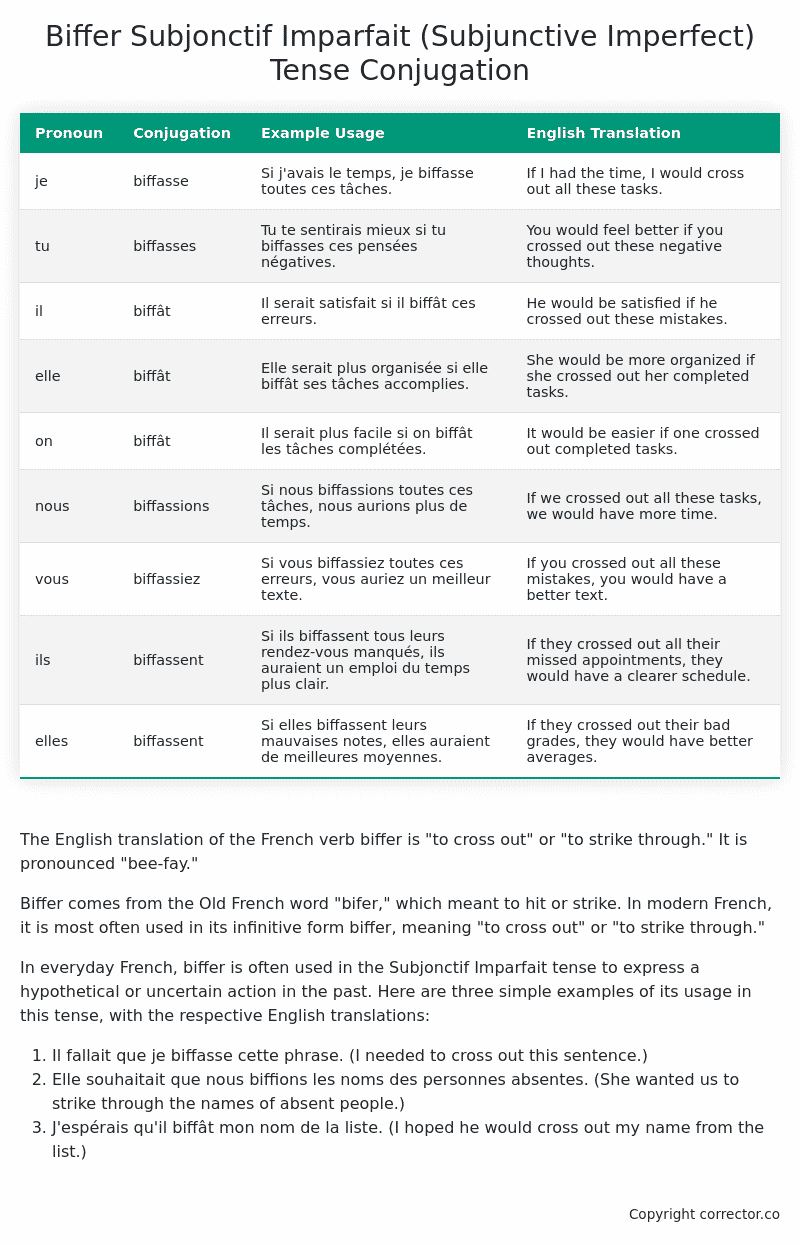Subjonctif Imparfait (Subjunctive Imperfect) Tense Conjugation of the French Verb biffer
Introduction to the verb biffer
The English translation of the French verb biffer is “to cross out” or “to strike through.” It is pronounced “bee-fay.”
Biffer comes from the Old French word “bifer,” which meant to hit or strike. In modern French, it is most often used in its infinitive form biffer, meaning “to cross out” or “to strike through.”
In everyday French, biffer is often used in the Subjonctif Imparfait tense to express a hypothetical or uncertain action in the past. Here are three simple examples of its usage in this tense, with the respective English translations:
- Il fallait que je biffasse cette phrase. (I needed to cross out this sentence.)
- Elle souhaitait que nous biffions les noms des personnes absentes. (She wanted us to strike through the names of absent people.)
- J’espérais qu’il biffât mon nom de la liste. (I hoped he would cross out my name from the list.)
Table of the Subjonctif Imparfait (Subjunctive Imperfect) Tense Conjugation of biffer
| Pronoun | Conjugation | Example Usage | English Translation |
|---|---|---|---|
| je | biffasse | Si j’avais le temps, je biffasse toutes ces tâches. | If I had the time, I would cross out all these tasks. |
| tu | biffasses | Tu te sentirais mieux si tu biffasses ces pensées négatives. | You would feel better if you crossed out these negative thoughts. |
| il | biffât | Il serait satisfait si il biffât ces erreurs. | He would be satisfied if he crossed out these mistakes. |
| elle | biffât | Elle serait plus organisée si elle biffât ses tâches accomplies. | She would be more organized if she crossed out her completed tasks. |
| on | biffât | Il serait plus facile si on biffât les tâches complétées. | It would be easier if one crossed out completed tasks. |
| nous | biffassions | Si nous biffassions toutes ces tâches, nous aurions plus de temps. | If we crossed out all these tasks, we would have more time. |
| vous | biffassiez | Si vous biffassiez toutes ces erreurs, vous auriez un meilleur texte. | If you crossed out all these mistakes, you would have a better text. |
| ils | biffassent | Si ils biffassent tous leurs rendez-vous manqués, ils auraient un emploi du temps plus clair. | If they crossed out all their missed appointments, they would have a clearer schedule. |
| elles | biffassent | Si elles biffassent leurs mauvaises notes, elles auraient de meilleures moyennes. | If they crossed out their bad grades, they would have better averages. |
Other Conjugations for Biffer.
Le Present (Present Tense) Conjugation of the French Verb biffer
Imparfait (Imperfect) Tense Conjugation of the French Verb biffer
Passé Simple (Simple Past) Tense Conjugation of the French Verb biffer
Passé Composé (Present Perfect) Tense Conjugation of the French Verb biffer
Futur Simple (Simple Future) Tense Conjugation of the French Verb biffer
Futur Proche (Near Future) Tense Conjugation of the French Verb biffer
Plus-que-parfait (Pluperfect) Tense Conjugation of the French Verb biffer
Passé Antérieur (Past Anterior) Tense Conjugation of the French Verb biffer
Futur Antérieur (Future Anterior) Tense Conjugation of the French Verb biffer
Subjonctif Présent (Subjunctive Present) Tense Conjugation of the French Verb biffer
Subjonctif Passé (Subjunctive Past) Tense Conjugation of the French Verb biffer
Subjonctif Imparfait (Subjunctive Imperfect) Tense Conjugation of the French Verb biffer (this article)
Subjonctif Plus-que-parfait (Subjunctive Pluperfect) Tense Conjugation of the French Verb biffer
Conditionnel Présent (Conditional Present) Tense Conjugation of the French Verb biffer
Conditionnel Passé (Conditional Past) Tense Conjugation of the French Verb biffer
L’impératif Présent (Imperative Present) Tense Conjugation of the French Verb biffer
L’infinitif Présent (Infinitive Present) Tense Conjugation of the French Verb biffer
Struggling with French verbs or the language in general? Why not use our free French Grammar Checker – no registration required!
Get a FREE Download Study Sheet of this Conjugation 🔥
Simply right click the image below, click “save image” and get your free reference for the biffer Subjonctif Imparfait tense conjugation!

Biffer – About the French Subjonctif Imparfait (Subjunctive Imperfect) Tense
Formation
Common Everyday Usage Patterns
Interactions with Other Tenses
Subjonctif Présent
Indicatif Passé Composé
Conditional
Conditional Perfect
Summary
I hope you enjoyed this article on the verb biffer. Still in a learning mood? Check out another TOTALLY random French verb conjugation!


